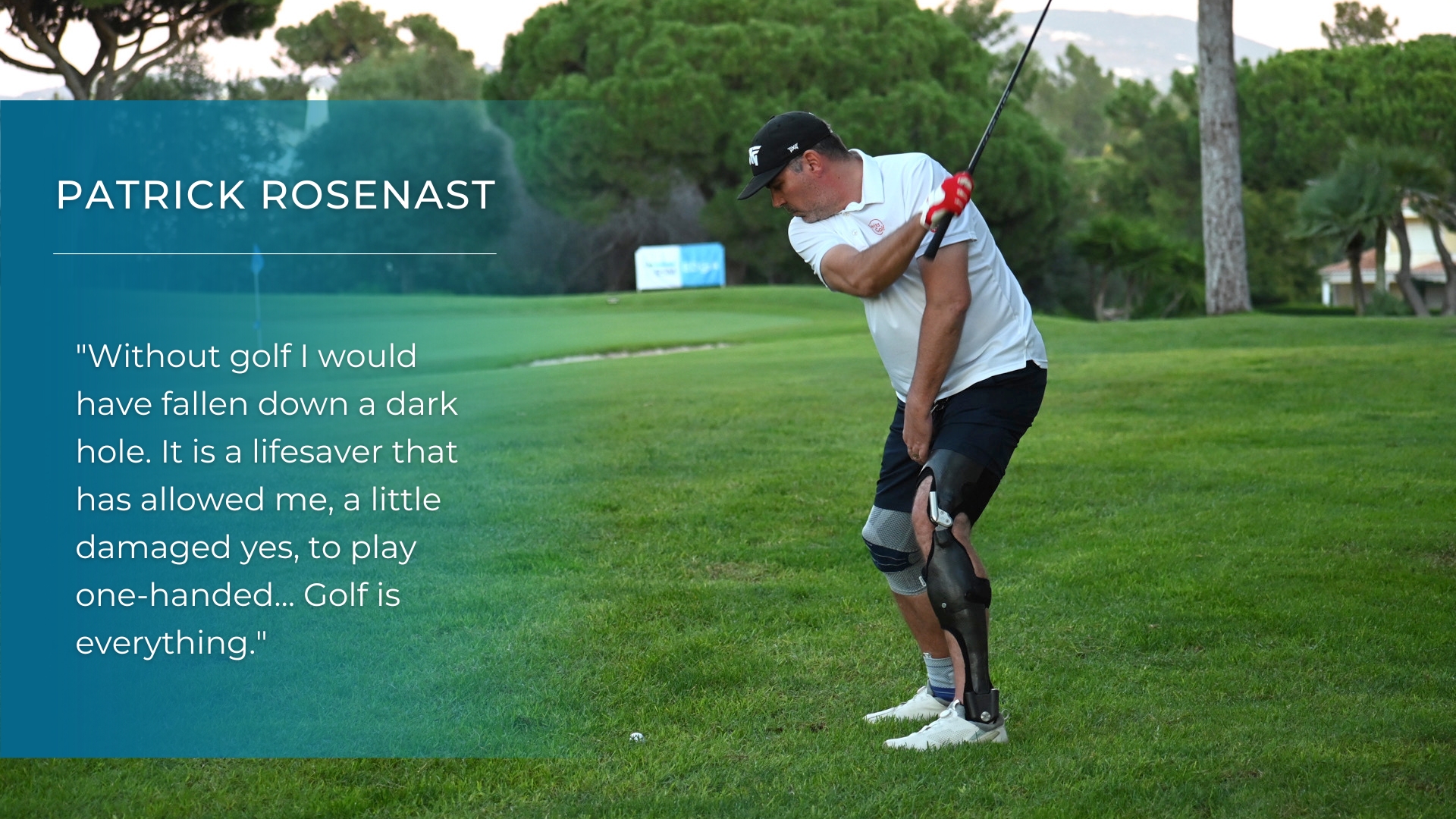This writer didn’t ask Patrick Rosenast whether he’d seen a psychotherapist during his rehabilitation but we suspect had he undergone such sessions, it would be doctor as well as patient who would have left inspired and full of energy when their time was up.
Such is the positive nature, analytical skill, and desire to act and make progress that is etched into Patrick’s manner and conversation, that 30 minutes into your session you might think anything is possible.
His laugh and smile is a tonic in itself but this tall 52 year-old from Switzerland is also clearly humble when he thanks those who helped him recover.
Patrick will tell you he is fortunate to have emerged from a couple of dark places and he is in no doubt of the part that his wife Rovena, his kids, family and friends played in supporting him. It was just in late 2020 that brain surgery led to haemorrhage and the symptoms of stroke, and ironically part of the reason he is now upright, walking, breathing and smiling, is due to his wife’s hobby, golf – which he initially resisted – that had a huge part to play in his rehabilitation.
“I would not be the Patrick of today without golf, definitely not,” is his summation.
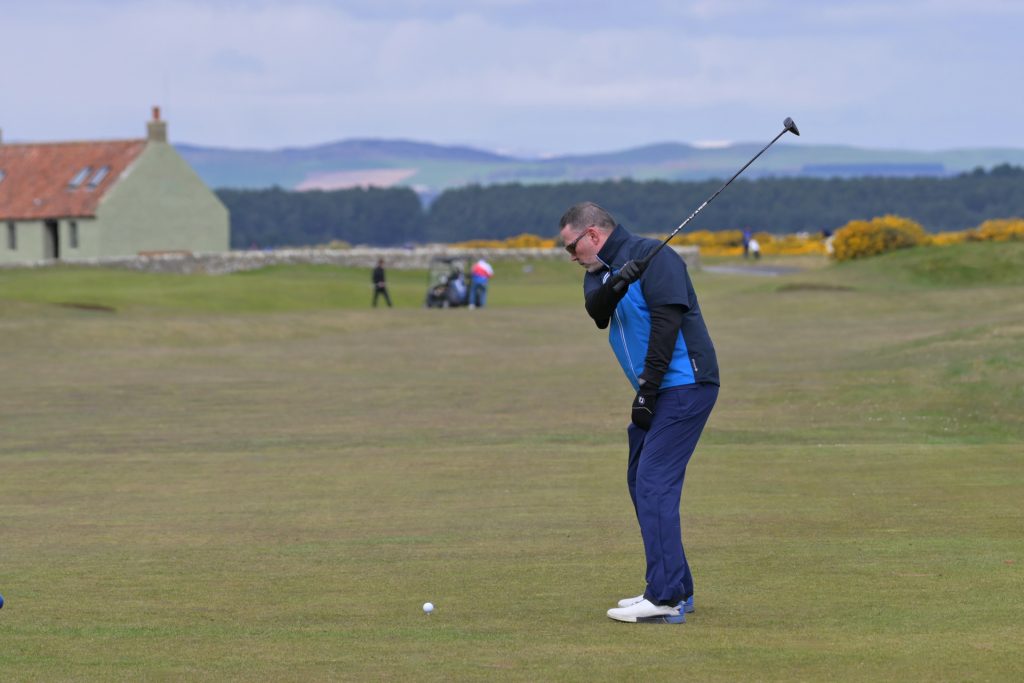
And without the notion of golf during rehab he wouldn’t have found his great friend Miro Waldvogel – a fellow golfer and sharp-as-a-tack character, who comes from a nearby area near Zurich. And without Miro, Patrick may not have done a pretty big exciting thing for G4D (golf for the disabled) in his home country, helping to inspire Swiss golfers on an exciting new pathway.
But let’s begin at the beginning. Patrick didn’t really like golf – he was into football, ice hockey, handball, tennis and later mountain biking. When he first got to know Rovena in 2014, he was still scarred from earlier experiences of golf as a young guy, when golf in Switzerland seemed just full of flash guys, parking their flash cars at the country club. Rovena extolled the virtues of the game – her swing today off an 11 handicap propels her drives 250 yards. Patrick tried it, off and on, largely to please Rovena, but in his mid-forties, he was trying to convert Rovena instead to his mountain biking.
Fortunately, where Rovena was concerned, it was not about the bike, and larger things loomed when she helped Patrick first in 2015. It was cancer in and around the stomach.
“I have to say, I am so fortunate to have the best wife in Rovena, and thankfully she was here for me several times. I once had cancer, which I recovered from. I didn’t needed chemo and all that kind of stuff but I was actually close to dying and didn’t realise. Rovena was telling me, ‘Patrick, now you must go to the doctor’.
“She pushed me there and that time she really saved my life. I was bleeding internally; I felt energy-less and I was white in my face. Walking up the stairs was like doing a bike marathon. I remember, I was at the doctor, he was taking blood and he was saying, ‘Hey, you need blood infusions, you hardly have any’.”
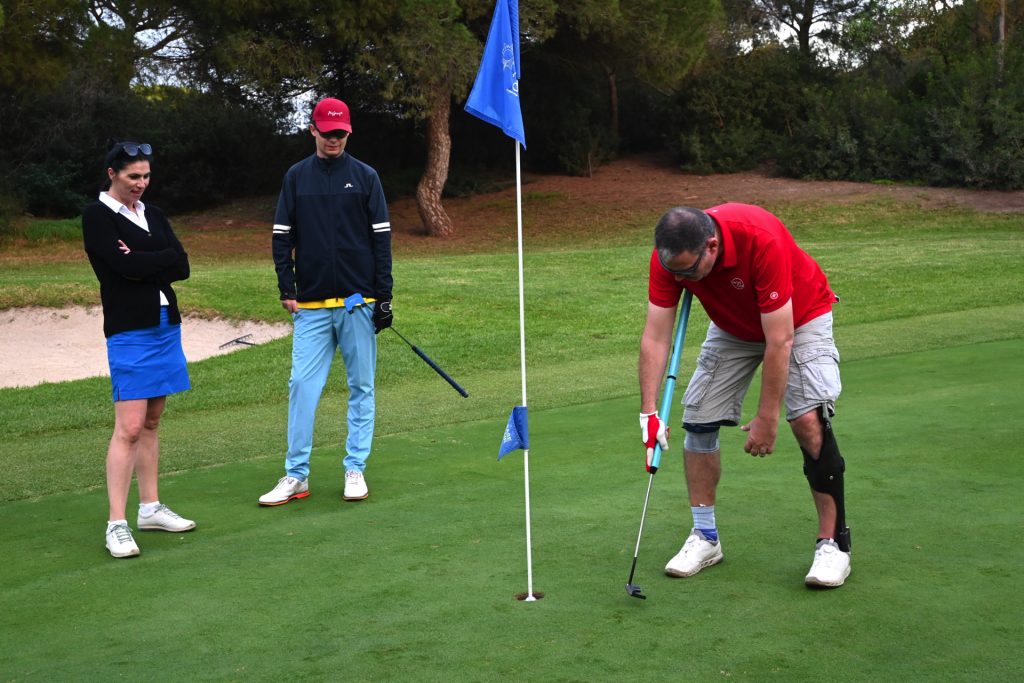
Patrick recovered, and when he wasn’t enjoying time with Rovena and their three daughters from her first marriage, he was often out in the beautiful hillsides in Switzerland on the bike, suffering a few falls in which he banged his head, which perhaps goes with the territory. His other great love – and he stresses he really loves his work, giving a huge smile – was operating as a securities finance trader in Zug.
“Yes, handling pressure, two, three things, multitasking always was an issue as a trader anyway. Quick thinking, quick responding, planning. I was working a lot, definitely too much.
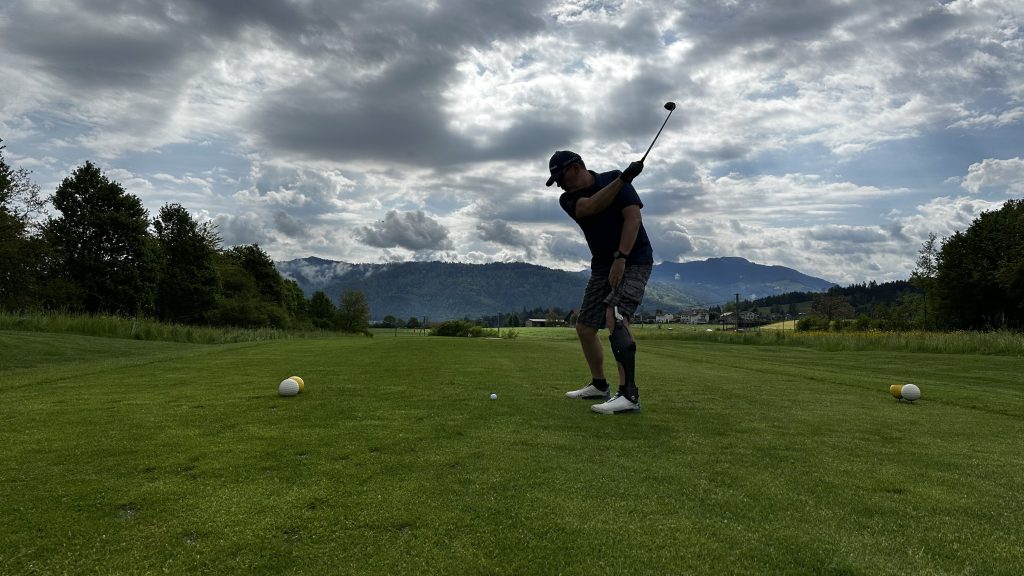
“I had been working since 1986 in the financial industry, mainly in trading positions. I think it was in 2020, and I I’d had headaches like crazy for two years and I couldn’t get away from them. I remember again my wife just said, ‘Now, really it’s time, you have to go.’
“Due to my mountain biking I’d fallen quite a lot from the bike, over the handlebar and on to my head and so on.”
When the doctors examined him they found the results of pressure building up in the arteries and veins working into the brain. It should have been a routine brain operation. “And yes, I think it was 0.03% that something could go wrong.”
As a statistician, the odds suited Patrick just fine and he went into surgery a little nervous but with confidence that all would be ok and that both he and Rovena could look forward to pursuing a single figure handicap in 2021. That was the plan. When he woke up everything had changed.
“I just felt, ‘Wow, where’s my left arm? Where’s my left leg?’ I couldn’t feel anything anymore. I know I was still under the narcotics but I knew that was not good. I was now thinking, ‘What’s my name, where am I from, my wife, kids, where I’m working, my dad’s birthday’, and so on. Just to realise that at least my brain was still working.
“I was lucky that my face hadn’t been affected. Any more time, and I may have been changed forever. So it was actually just the left side which wasn’t moving.
“I always know that I’m very, very positive and that definitely helped. Together of course with my wife supporting me so much as well during that period. For her as well, this was a huge shock, seeing me just laying in the bed. I could not even go alone to the toilet or take a shower or whatever. But she was just giving me so much energy as well, so much support, and she said, ‘Look, it doesn’t matter’.
Patrick would also like to thank all of the medical and support staff who looked after him in this period. “Incredible people who did an amazing job, I couldn’t have made it without them.”
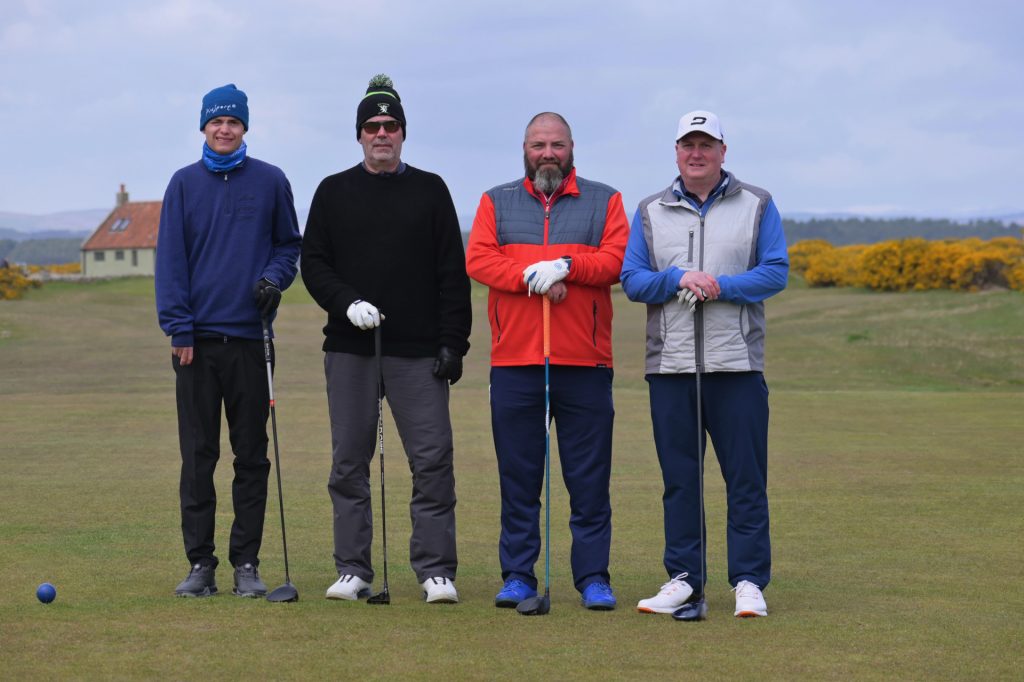
This was all only at the end of October, 2020. What strikes you next in the conversation, is that early in his rehabilitation, Patrick started researching online with positive intent, first about the best wheelchairs to consider, which were the lightest, the most mobile, and then what sport and activity he might look forward to.
This research would lead him to fellow Swiss golfer and now close friend Miro, who had faced a very similar brain injury himself in many respects since birth, and to Manuel de los Santos of the Dominican Republic and France, who is seen in videos playing off his right leg after amputation to a very high level; then to the work of EDGA, and the forming of a friendship with Urs Bucher, the Swiss Paralympian who is famed for his prowess in wheelchair curling, himself an EDGA golfer who hits from a paragolfer. The encouragement of Urs would lead to great new steps for golfers with a disability, thanks to Patrick, Miro, Miro’s father David and a few other key supporters, with support from the national federation, Swiss Golf, and PluSport.
That first contact with young Miro was a crucial driver.
“Yes, exactly, exactly. So, I didn’t feel alone. I was sending him an email and was saying, ‘Hi Guy, I saw your video, I’m surprised, inspired, can we meet up? Because now I have to start playing as well; pick up golf again with one arm this time. And I’m sure that you can be of assistance for me.’ Then we met and got on so well from the start and played our first tournament in Turin in Italy. Since then we have been travelling with EDGA around Europe!
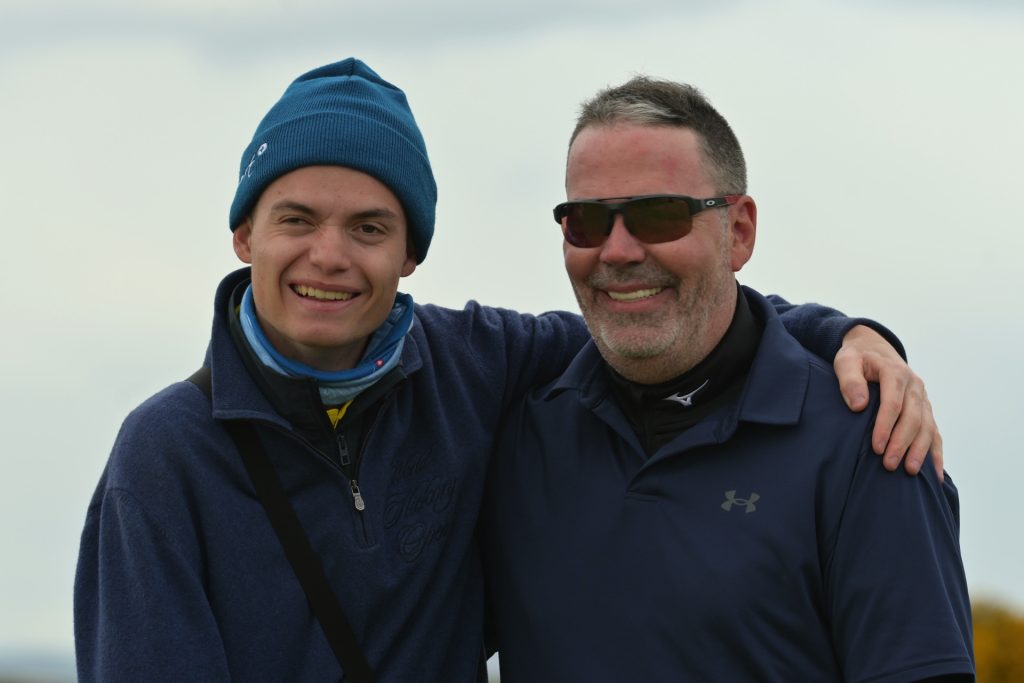
“And then I found as well Urs Bucher, when I was in the rehab, because I was in a wheelchair as well at the beginning because I couldn’t walk. Of course I was Googling and I saw a lot of golfers playing in a wheelchair. And for me at that time it was clear, it doesn’t matter, if I’m in a wheelchair, okay, I’m in a wheelchair, then I will be a wheelchair golfer. If I can stand up again and walk in a certain way, yes, that’s okay too.”
Patrick’s positivity and the support of Rovena made for good rehab, seeing him leave the Rehaklinik Zihlschlacht after four months, to continue improving his motor skills and range of movement and then to the point of considering even returning to work.
“The problem I had coming back from the brain damage itself, I remember the first training and rehab we did, the sessions, concentration and so on: it was five minutes and then I was totally destroyed. I had to go for a one hour sleep because I was so tired and the brain was empty. And it came back slowly, slowly, slowly.
“Today the brain function works fine. Nevertheless, stress, working a lot, it needs power, it needs energy because every step I do with my left foot, I have to concentrate.”
Remarkably, Patrick reported for a fortnight’s work trial period back with his company, Interactive Brokers, in mid-March 2021, four-and-a-half months after his brain trauma.
“It was 15th of March to 1st of April, we did a trial phase, for me also, to check I was okay. And then it was planned two hours, three hours, four hours, five, six hours. But I was happy because it’s the best job ever. I think one-and-a-half months later, I was back at eight hours. Longer days also yes, of course, but I love the work.”
Huge praise therefore to Patrick’s colleagues, who encouraged him to rejoin the team and did so because he was such an important part of their team. Patrick wished to thank Paul Brody, Brian Sussman and Roman Joos and many more colleagues for their “fantastic support”.
Today, golf also continues to play a vital role.
“Without golf I would have fallen down a dark hole,” says Patrick. “It is a lifesaver that has allowed me, a little damaged yes, to play one-handed… Golf is everything.
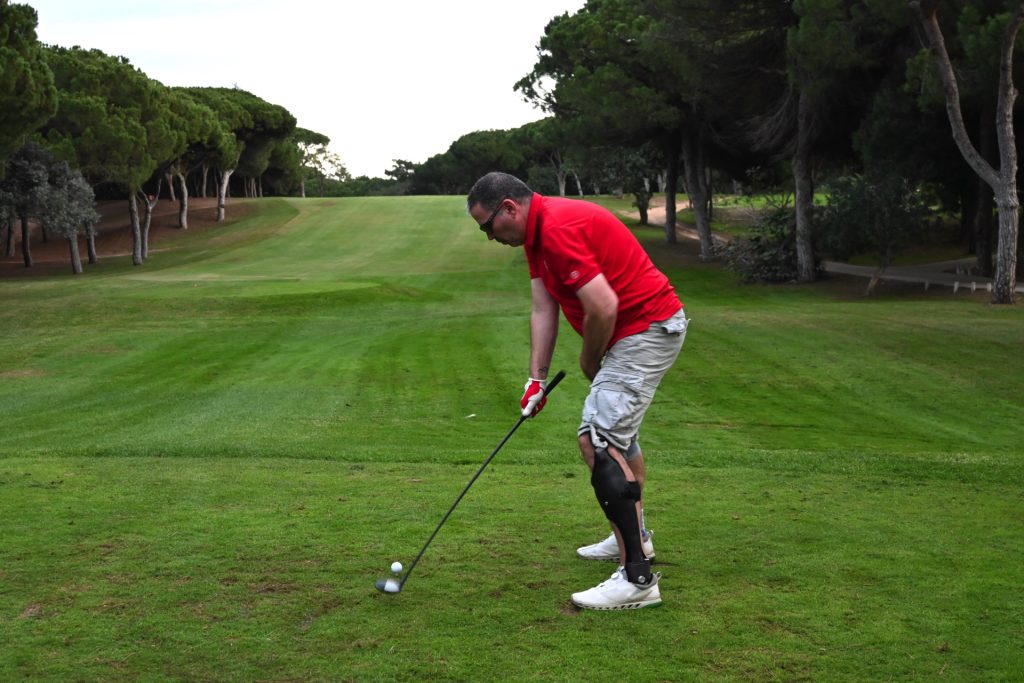
“For me, knowing that golf is still an option, it doesn’t matter if I’m in a wheelchair or in any other form of playing golf, having actually the possibility in my rehab, having lessons where I could play golf in-house, not on a golf course… But it was all therapy to have the balance, gaining balance back to try to swing and so on. And then I would say family, my wife, kids, friends, standing there behind me of course, and most importantly, safety of the job and knowing that I will be back on the golf course. That was all so important for my wellbeing and getting back. Because I knew mountain biking was not possible. But golf, due to the videos I saw and everything, I knew… Wow!
“I would not be the Patrick of today without golf, definitely not.”
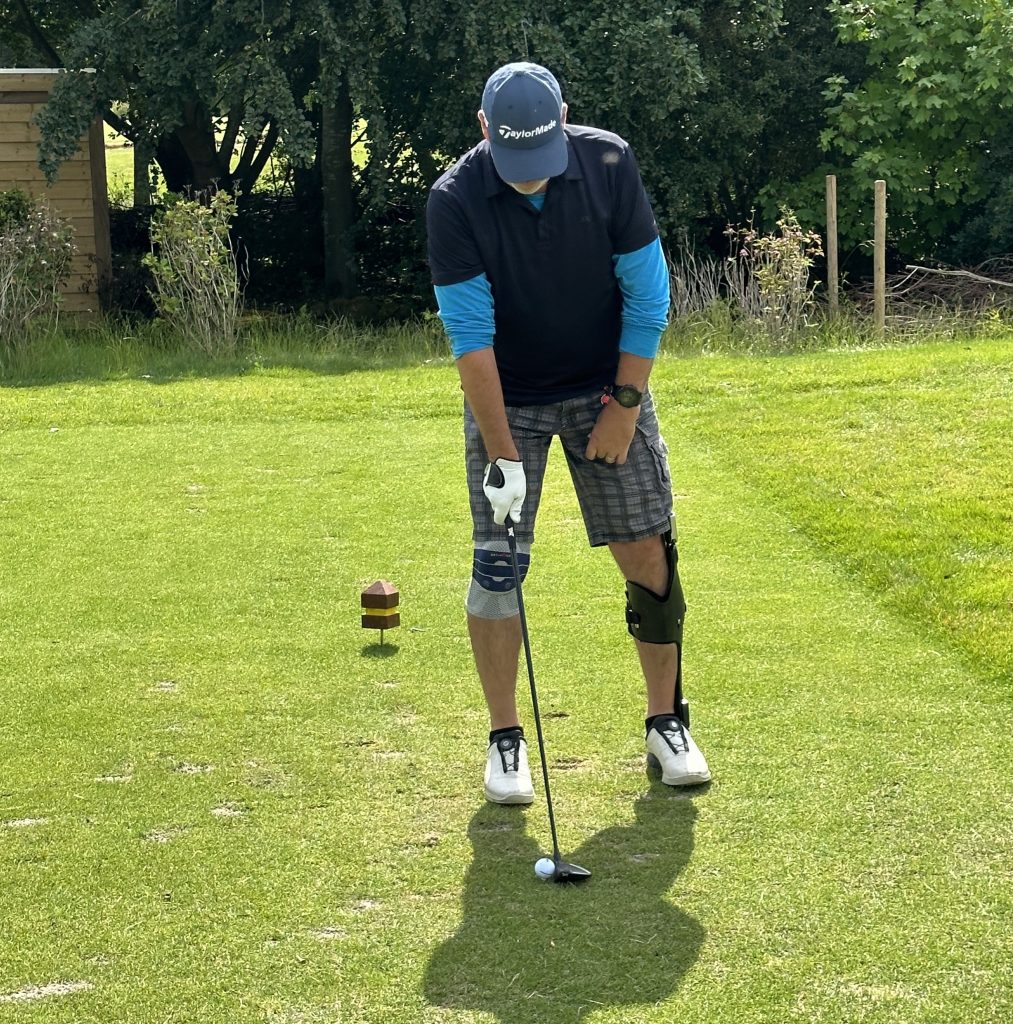
Patrick has to think carefully about movement and there are areas of his left side that don’t quite obey his thoughts. He plays right-handed, but with a backhand swing.
“Today, when I’m standing, my knees feel light like a feather. I do not have the possibilities for correct compression of the muscle, of all the muscle groups, to make a solid stance. I was trying to play with the two hands and swing this way. And then I said, ‘Why have something which bothers you in your swing, play with the one hand.”

Seeing Patrick and his friend Miro together you immediately sense their natural bond, their chemistry. Both have mischievous senses of humour, the younger Miro never afraid to poke fun at the avuncular Patrick. Both have suffered brain injuries that have had a similar impact on their lives and both display a tremendous attitude and desire to get the most out of life, out of every day, partly through their golfing adventures. The two men have now played half a dozen EDGA events together in different countries from Portugal, Switzerland, Belgium to the UK where they were recently at the St Andrews Links Open and most recently playing in the Irish Open for Golfers with Disability in Roganstown, Dublin.
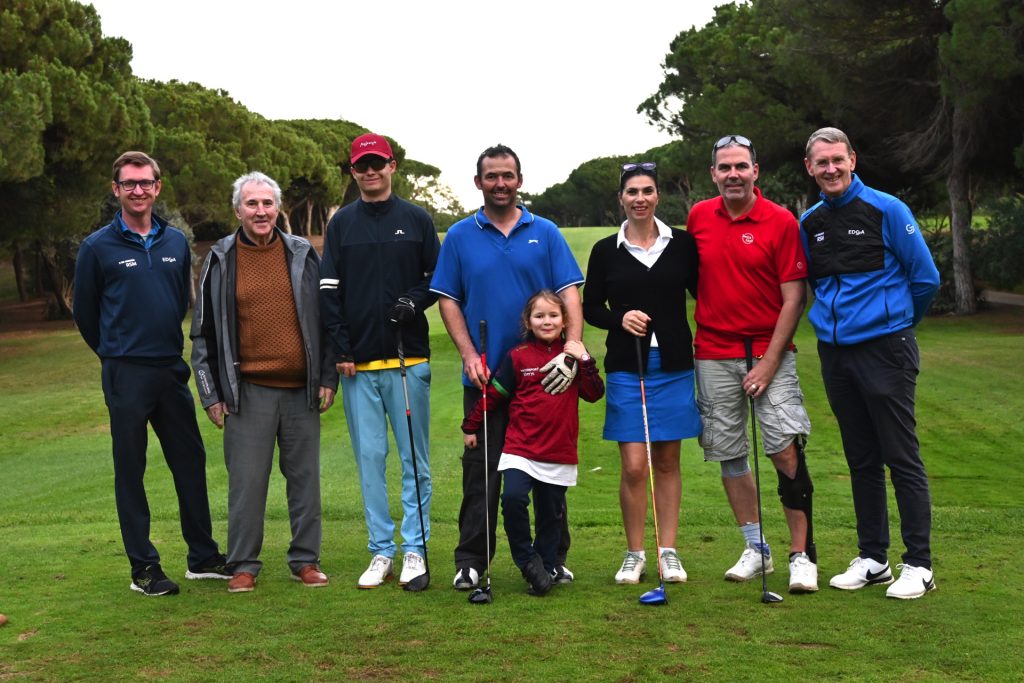
When we first met up with Patrick at Vila Sol, in the Algarve, Portugal, he said it fills him with pride as a Swiss golfer with disability to be able to participate in international tournaments. “It is an amazing experience, it is an honour actually to play for Switzerland, to be here representing my country. I’m proud.”
Working with Urs Bucher, fellow EDGA player Emmanuel Berset, Miro and Miro’s father David Luisi, last year Patrick was integral to setting up the Swiss ParaGolf Association. The new association has started with 16 active members but Patrick is confident this will grow in the next years with the support of friends of our association and maybe someday with the support of other national organizations that are committed to disabled golf in Switzerland.
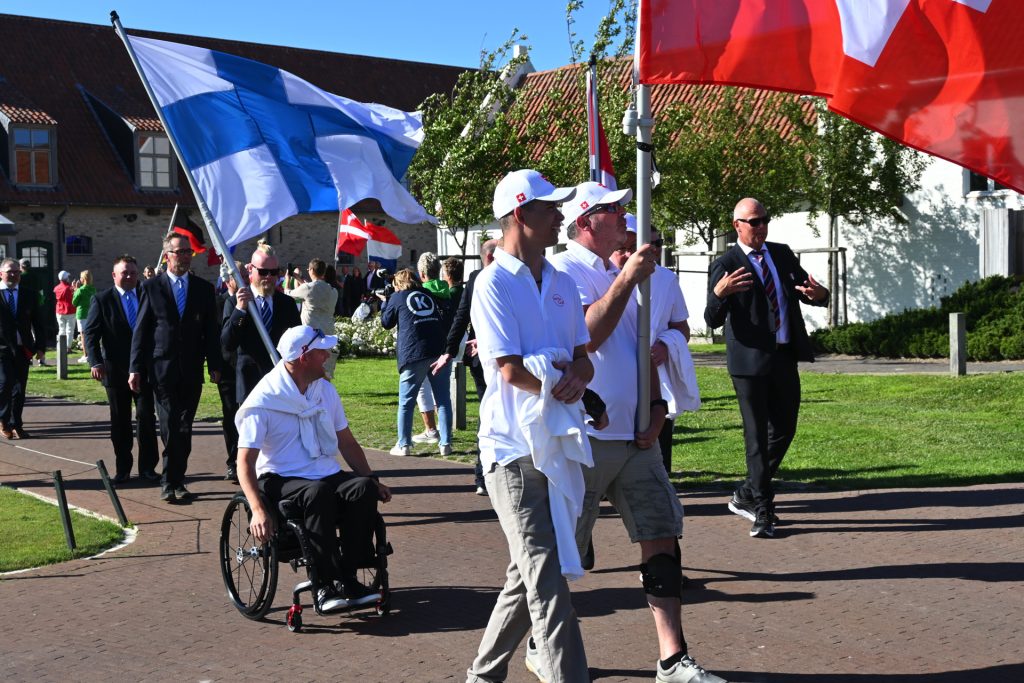
He would also like to express a big thank to Swiss Golf and PluSport, which last year for the first time held the Swiss Golf Open G4D Championship in Ascona (2023 edition at the end of July in Bonmont). This championship takes place at the same time and on the same course as the national amateur championship and also invites golfers from the Special Olympics.
Patrick is also impressed by the company MIGROS GOLF which, with its mission statement ‘Golf for all’ has added to interest in the game in Switzerland, and Patrick thanks the company for their positive work.
The Swiss Golf association is one of 39 countries who are members of EDGA and visitors to Swiss Golf’s website (see end) will find information on how to start in the game, where to play and advice on training and development of volunteers and staff. New innovations like GolfSixes (six-hole team format) and Golf4Girls grab your attention but in the July issue of the magazine Swiss Golf, found on this website, the editor offers three more inspiring stories under the headline, ‘For All’.
Here, we meet Pierre Massard, who is thriving through golf playing from a ‘paragolfer’ after a serious mountain accident in 2004. “Different on the outside, similar on the inside”, is Pierre’s view. Meet also Doris Stalder, who is visually impaired but found a new love in playing golf at the age of 60. And Fabiano Paratore who went through a lung transplant in 2019 but is back on the course and keeping his faith in life through golf.
Patrick pointed out the magazine to us which he was delighted to see, and he now hopes more people with a disability, many brand new to golf, may be discovering EDGA and the national associations’ work in the media.
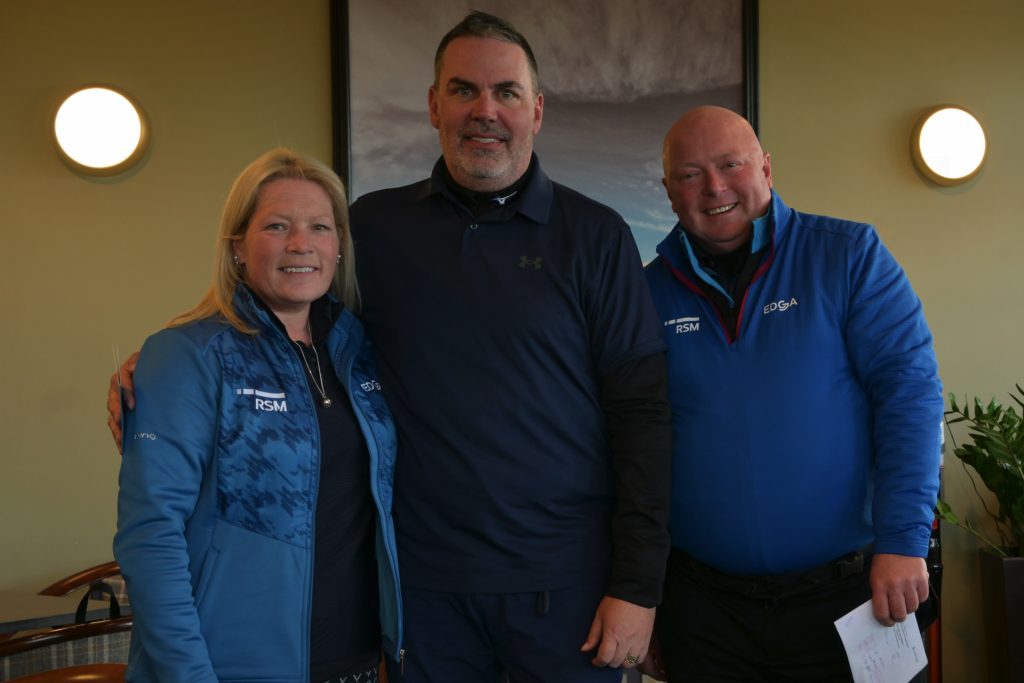
“I am thankful that EDGA exists. It’s amazing what these guys have done for disabled golfers. And then of course, all the EDGA movies on YouTube and so on, that was an inspiration I have to say. In the rehab it gave me a lot of mental strength – that you will get out of the wheelchair, you will play golf again.”
Patrick is perhaps most proud that he was able to create a team of four golfers, for the first time, to play in the EGA’s European Nation’s Cup for Golfers with Disability in June 2022, flying the flag for the Swiss Golf federation. Patrick, Miro, Emmanuel Berset and fourth team member Patrick Maurin were proud and delighted to take part.
“This was just wonderful, an inspiration. I think it would not have been possible if I would have not been so stubborn and really push it through. But we just wanted to take part in it because we knew it was essential.
“Whatever kind of result, we didn’t care. We just wanted to be there, show up and play.”
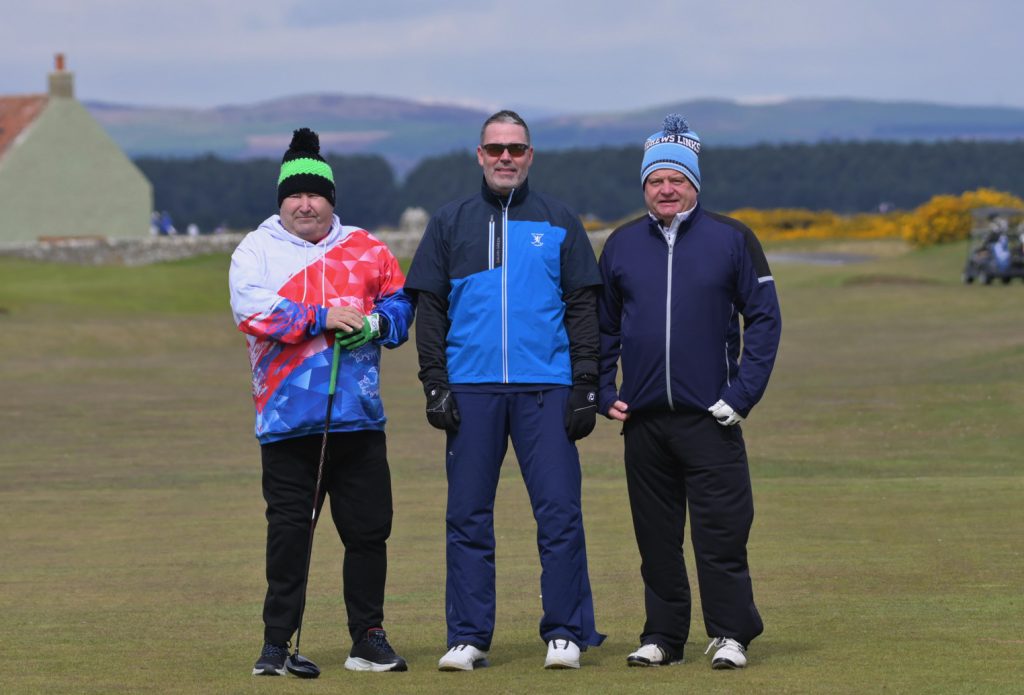
Doing such a thing for the first time can be the hardest challenge and Patrick and Miro and the team worked wonders just to take part. Since his brain injury in 2020 there have been many ‘peaks and troughs’ for Patrick, that is expected. What’s not quite so expected is the positivity he uses to face these challenges, employing his love of the fresh air, exercise and camaraderie of golf to maximum effect. But he doesn’t call them ‘peaks’, they don’t quite do the good times justice: he likes the word pyramids.
“I would say if one of these pyramids had been missed, I would not be here today where I am. Definitely not. And yes, look, this is just amazing. You play golf with a handicap, you go to tee one, people don’t know you. They see you playing with one arm, the ball flies. It doesn’t fly 250, maybe it flies 160, but it flies straight. These guys are just impressed.
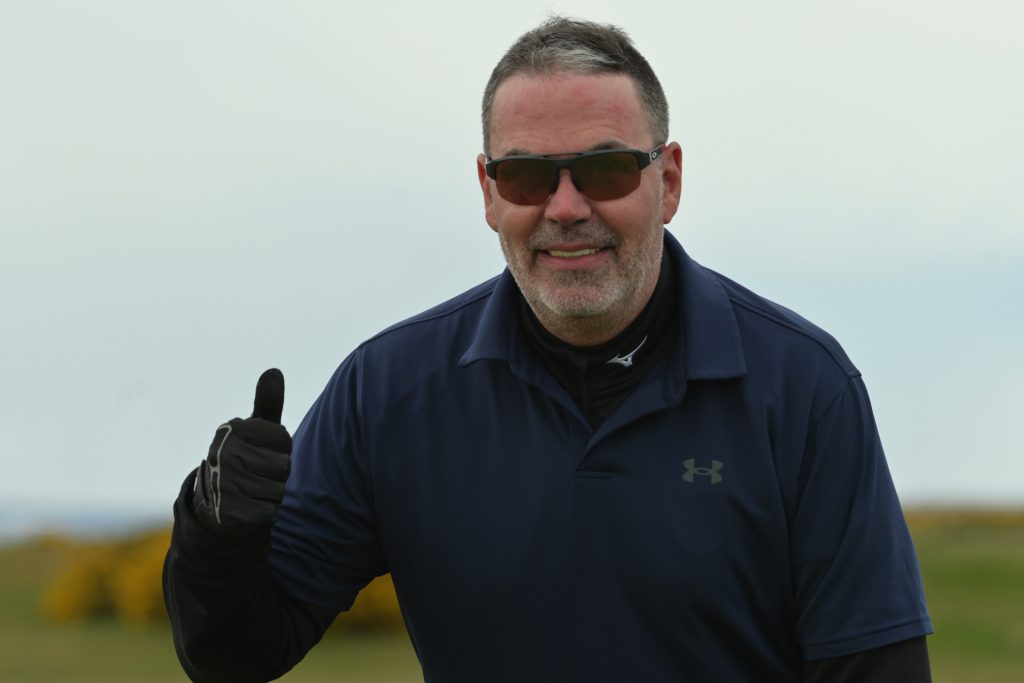
“And being able as a disabled sports person to participate with non-disabled ones in the same game, this is something unique as well. I don’t know another sport where you actually can do it. But I would say in golf there is no barrier between disability and non-disability, it doesn’t matter.”
Check out the Swiss Golf Association (Swiss Golf) and check their magazine at https://swissgolf.ch/
Swiss players with a disability can also check out Patrick and friends’ association at https://www.swissparagolf.ch/
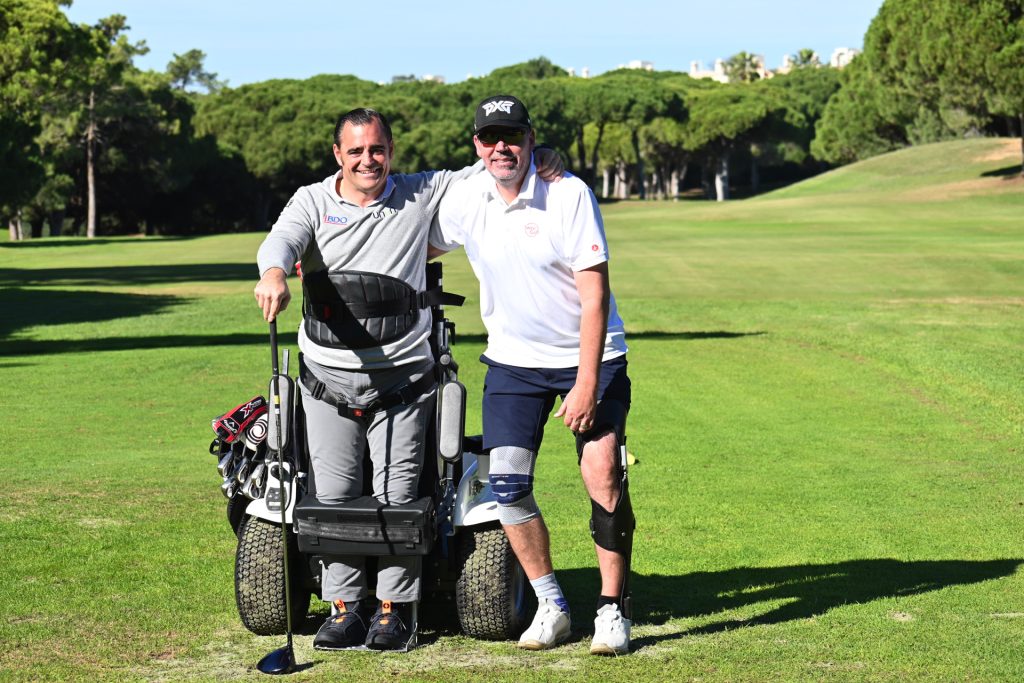
NB: When using any EDGA media, please comply with our copyright conditions


